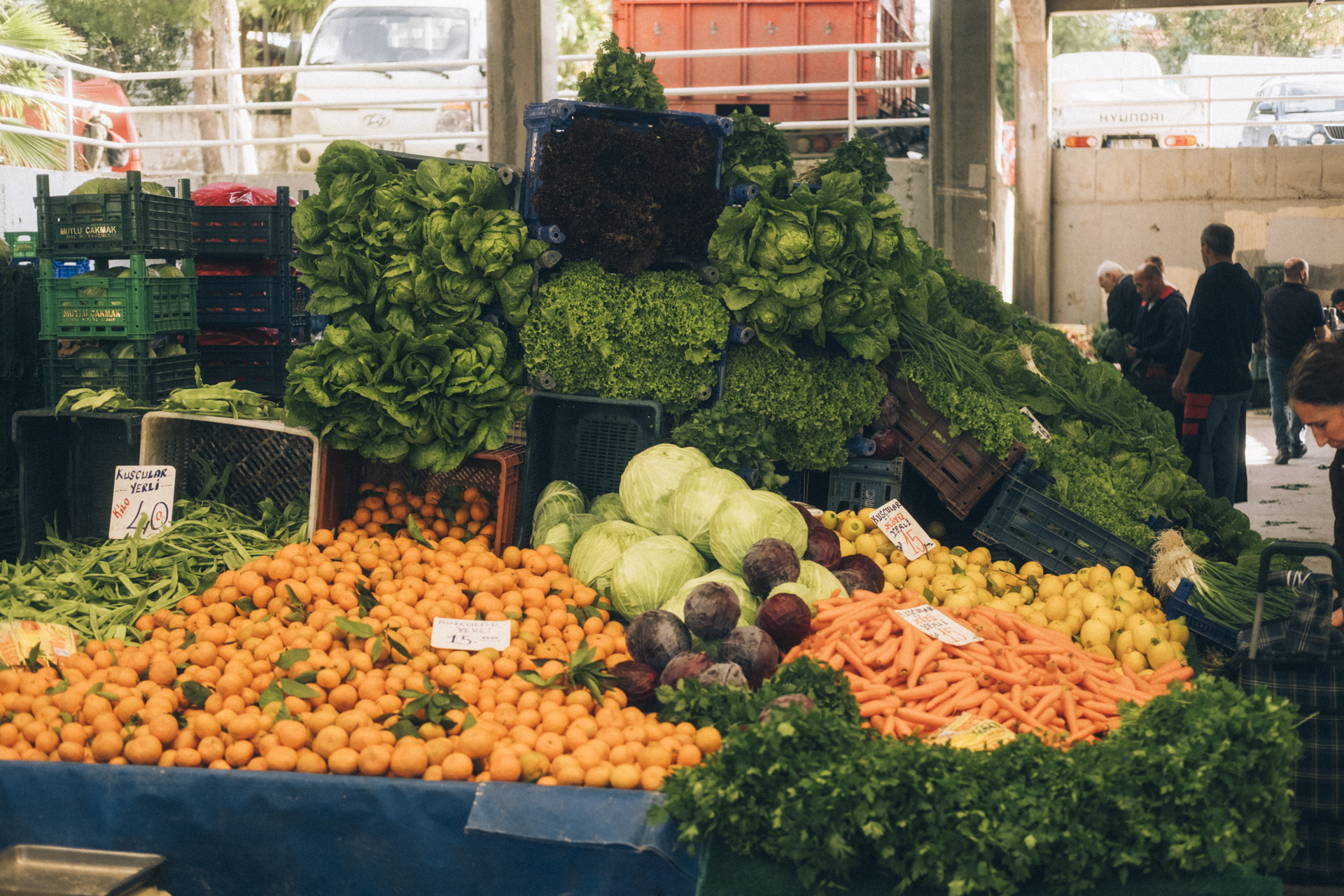In Istanbul, the most developed region of the country, you can easily find vegetarian and vegan restaurants. Asking for vegan options is still not very common, but in establishments with a higher price range you can find waiters familiar with vegan options. In the Aegean region, including cities like Izmir and Bodrum, there are many dishes that are naturally vegan. It’s probably the most vegan-friendly region in the country. They are known for their olive oil based dishes (zeytinyagli yemekleri). In the central Anatolian region, like Ankara, many meat dishes are quite prevalent here, but there are also many grain-based dishes available. In the Mediterranean and southeastern Anatolian regions, like Antalya, Adana, and Gaziantep, meat is everywhere – you might end up eating the same vegan things over and over again – it’s hard to get as creative in eastern Turkey compared to western Turkey.
(A Growing List of) Vegan Dishes
Although there’s no guarantee that these dishes are 100% vegan, most of the time they are. The exceptions are usually when they use broth or oil with animal products. It’s always best to ask if you anticipate something 100% vegan.
Hot Meals
- Ezogelin Çorbası (Red lentil soup): A traditional Turkish soup made from a mix of red lentils, bulgur, and rice, seasoned with mint, pepper, and sometimes tomato paste. It’s often vegan, but confirm that no meat stock is used.
- Mercimek Çorbası (green lentil soup): A hearty and nutritious stew made from green lentils, cooked with onions, tomatoes, and carrots, often seasoned with cumin and other spices.
- Mercimek yemeği (green lentil stew): A hearty and nutritious stew made from green lentils, cooked with onions, tomatoes, and carrots, often seasoned with cumin and other spices.
- İmam bayıldı: Eggplants stuffed with a mixture of onions, garlic, and tomatoes, all cooked in olive oil. The name translates to “the imam fainted,” supposedly because the dish was so delicious.
- Pide : A type of flatbread, topped with various ingredients. Vegan options include toppings like spinach, mushrooms, tomatoes, and peppers, without cheese or meat.
Zeytinyağlı, Meze, Sides
Some items on this list can be served hot or cold.
- Acılı Ezme (Spicy Tomato and Pepper Dip): A finely chopped and spicy mix of tomatoes, peppers, onions, garlic, and herbs, often served as a condiment or meze.
- Barbunya (Red Kidney Beans): Cooked with carrots, potatoes, and onions in a tomato sauce with olive oil.
- Bulgur Pilavı (Bulgur Pilaf): Made from bulgur wheat, cooked with tomatoes, onions, and peppers, often served as a side or main dish.
- Ciğ Köfte: This may fool you if you have already learned that the word for “kofte” is “meat patty” – but this street food wrap, 99.9999% of the time will be made with bulgur wheat and spices and without meat. It’s hard to find the meat version because it’s illegal to sell due to safety concerns (“ciğ” means “raw”). Meat eaters curious about the real version? Tell someone from southeast Turkey and they’ll make it for you at home.
- Dolma (Stuffed Vegetables – Biber Dolması, Patlıcan Dolması, Kabak Dolması, etc.): Bell peppers, eggplants, or zucchini, usually stuffed with rice, pine nuts, and spices, cooked in olive oil. Some are made with minced meat. See Yalancı Dolma below.
- Enginar (Artichokes): Cooked with peas and carrots in a lemony olive oil sauce (seasonal).
- Humus (Hummus): Chickpeas, tahini (sesame paste), lemon juice, and garlic.
- Ispanak (Spinach): Cooked in olive oil with rice and onions, sometimes with a hint of lemon.
- Kereviz (Celery Root): Cooked with carrots and potatoes in an olive oil and orange juice mixture.
- Kısır: A refreshing salad made from fine bulgur, mixed with tomato paste, finely chopped parsley, green onions, and a variety of herbs, often flavored with pomegranate molasses and lemon juice.
- Kuru Fasulye (White Beans): Cooked with onions and salça; ensure no meat or meat broth is added.
- Mercimek Köftesi (Lentil Balls): Red lentils and fine bulgur, mixed with onions, tomato paste, and various spices, shaped into small balls or patties.
- Muhammara: A spicy red pepper and walnut dip, usually made with breadcrumbs, olive oil, and pomegranate molasses.
- Pazı (Swiss Chard): Cooked with onions and rice in olive oil.
- Patlıcan (Eggplant): Cooked with tomatoes, green peppers, and onions, all simmered in olive oil.
- Patlıcan Salatası (Eggplant Salad): Made from grilled or roasted eggplants, red bell peppers, and green peppers, all chopped and mixed with finely diced onions, tomatoes, and garlic. There’s a yogurt version of this as well.
- Pırasa (Leeks): Cooked with carrots and rice in olive oil.
- Salata (Salads): It is extremely uncommon to find animal products in Turkish salads; you won’t find any unless you are at a restaurant that specifically serves salads with meat as an entrée. Salads are extremely common at dinner and usually sit in the middle of the table for everyone to serve themselves.
- Taze Fasulye (Green Beans): Cooked with tomatoes and onions in olive oil.
- Yalancı Dolma (Stuffed vegetables): This term can also refer to stuffed vegetables (see dolma) but specifically emphasizes that the stuffing is made without meat, hence “yalancı” (meaning “false” or “imitation”). The filling is similar to dolma but is always vegan.
- Yaprak Sarma (Stuffed Grape Leaves): Grape leaves stuffed with a mixture of rice and spices, then cooked in olive oil.
Pastries and sweets
- Cezerye: A sweet made from caramelized carrots, flavored with cinnamon and coated in coconut. It’s a vegan-friendly treat commonly found in Turkey.
- Gözleme: A traditional Turkish flatbread filled with various ingredients, vegan options often include potato, spinach, or leek.
- Helva (Halva): A dense, sweet treat made from sesame paste (tahini) and sugar, often flavored with vanilla or cocoa. It’s naturally vegan, but always double-check for any added ingredients.
- İspanaklı börek: If made without butter or eggs, a popular vegan option being spinach.
- Kabak Tatlısı: Made from slow-cooked pumpkin, usually topped with walnuts and served with a drizzle of tahini. One of the desserts you typically only see seasonally. Ensure no honey or other animal-based ingredients are added.
- Lokma: A sweet, deep-fried dough ball, soaked in syrup. It’s traditionally vegan, but confirm that no dairy or eggs are used in the dough.
- Lokum (Turkish Delight): A traditional confection made from sugar and starch, often flavored with rosewater, lemon, or other fruit essences. Some versions may contain nuts. Be sure to check that no gelatin or other animal products are used.
- Vegan-Friendly Baklava at Karaköy Güllüoğlu: This renowned baklava shop in Istanbul offers a vegan-friendly version of baklava, made without butter or honey, using vegetable oil and a sugar-based syrup instead.
Turkish Breakfast (Kahvaltı)
Even though there’s a lot of animal products at breakfast, you can still enjoy something delicious given Turkish breakfast is just a smorgasbord of a billion things. Starting your day with a salad is pretty perfect. Vegans can enjoy:
- Tomatoes (Domates)
- Cucumber (Salatalık)
- Olives (Zeytin)
- Jams (Reçel)
- Tahini and Grape Molasses (Tahin Pekmez)
- Muhammara, ezme, and other tomato based dips
- Fresh bread (ekmek), Börek, and / or gözleme
Watch out…
Many of the breads and pastries (like simit, börek, gözleme, and baklava) may seem vegan but are often glazed with egg, butter, or milk. Even vegetable soups and dishes may be cooked with butter or served with yogurt, and some might use a meat-based broth for flavoring. Rice is commonly cooked in butter and sometimes even chicken broth.
When eating in restaurants
Many will understand the concept of “veganism”, especially in the larger cities or tourist areas. It might be trickier in smaller towns or villages where the concept is not as well known. Explaining that you don’t eat meat, dairy, eggs, or any animal products usually works. There’s a chance someone will say “Oh, you’re vegan? We have chicken” – yes, it happens. So always ask away and learn some animal product words if you’d like (“tavuk suyu”= chicken broth – see more in our food/ingredient dictionary guide that comes with the Phrasebook Plus)
When eating in homes
It might be a more difficult scenario, as Turkish hospitality is renowned and refusing offered food might be seen as impolite. It would be beneficial to explain your dietary restrictions in advance if possible. If you allow yourself cheat days, Turkey is a great place to embrace flexitarianism.
If you’re cooking your own meals at home, ordering vegan products online or finding them at select shops is easy. Websites like veganbakkal.com, etikbakkal.com, vegandukkan.com, and justveganstore.com offer a variety of vegan cheeses, yogurts, meat substitutes, and even cosmetics. Supermarkets like Metro, Bonveno, and Macrocenter carry a decent selection of vegan products compared to others. If there’s an A101 nearby, don’t miss checking out the Nimet brand’s vegan eggplant pastry (börek) in the freezer section. They also have zucchini, potato, and carrot varieties—ideal for breakfast and definitely worth trying.
Social media + resources
Platforms like Facebook or Instagram have various groups and pages dedicated to veganism in Turkey, many of them in English. Examples include “Vegan in Turkey” on Facebook and “Vegan Türkiye” on Instagram. They often share restaurant recommendations, recipes, and tips for vegan living in Turkey.
Moreover, HappyCow, an online service that lists vegan and vegetarian restaurants, has plenty of entries for Turkey which could be of great assistance to a vegan tourist or foreign resident. There’s also a smartphone application called VeganXpress that lists vegan options at popular chain restaurants.
 Photograph by Burçin Esin
Photograph by Burçin Esin


